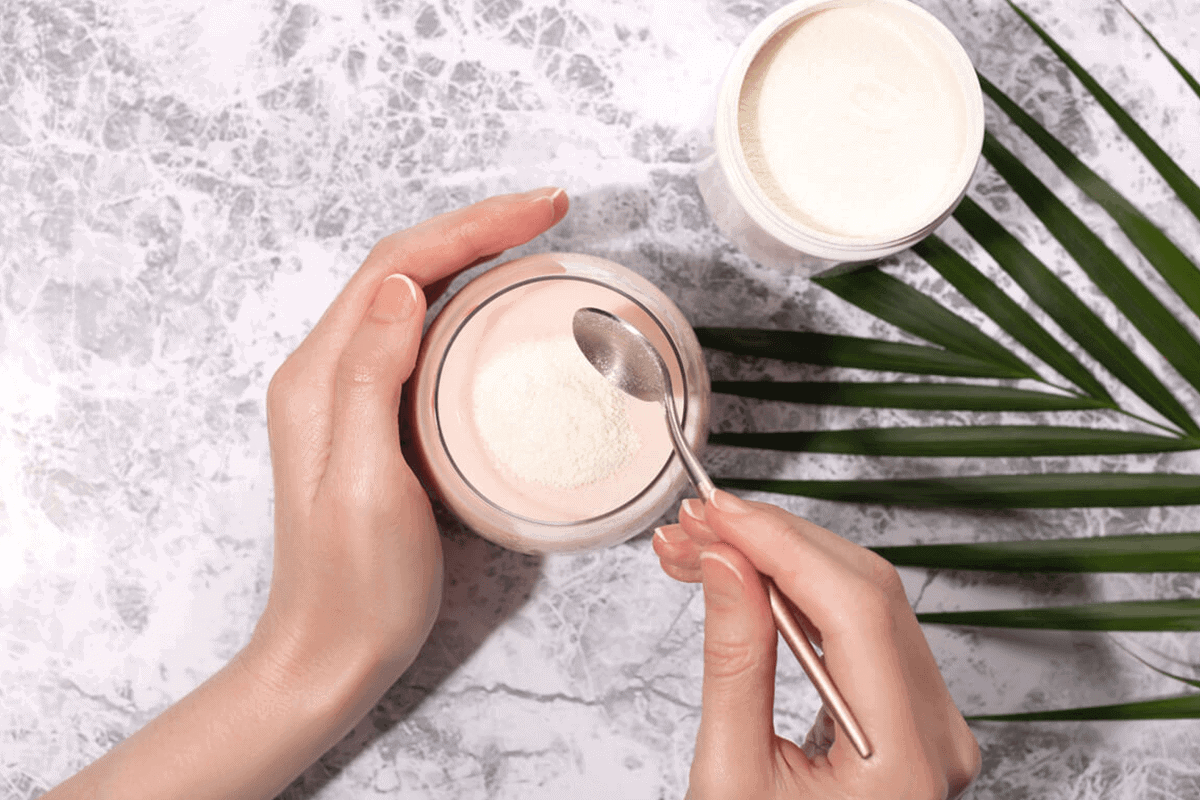Relieve Your Activity-Related Joint Pain With These Collagen Benefits
Written by
Kim Erickson
November 19, 2019
Painful joints are often considered an inevitable part of the aging process. In fact, 22.7 percent of all adults in America suffer from some joint discomfort—and more than half of them are over the age of 65. (1) While the Arthritis Foundation notes that participating in regular physical activity can reduce joint pain by as much as 40 percent, it can be hard to live an active lifestyle when it hurts to move! (2)
But here’s the good news: research suggests that supplementing with collagen—a key structural protein that keeps joints healthy—may help ease activity-related pain.

Why collagen helps painful joints
Joints are the places where your bones come together to allow for coordinated movement. There are 206 bones in the human skeleton and the vast majority of them come together in joints, where a cavity filled with fluid separates the bones from each other. Cartilage—spongy tissue on the end of each bone—covers the connecting surfaces of the bones where they join, allowing them to effortlessly glide one bone over the other. But as we age, the body produces less of the collagen that makes up the cartilage essential to well-functioning joints. Over time, cartilage begins to break down, eventually causing bone to rub against bone. (3) The result is inflammation, pain, and stiffness.
Collagen is the most abundant protein in the human body and it essentially holds everything—from your skin to your muscles to your joints—together. While there are more than 16 different types of collagen, when it comes to your joints, Type II collagen reigns supreme. (4) Although collagen production in the body naturally declines with age, a diet high in sugar and processed foods can accelerate its deterioration and trigger inflammation, which can amplify joint pain. (5) But research suggests that providing joints with collagen from external sources can supplement declining levels and help reduce pain and inflammation.
Did you know? Providing structure to much of your body, the word “collagen” comes from the Greek word “kólla,” which means glue.

Collagen supplements for joint pain
Collagen can be found in many animal foods like beef, chicken, fish, and bone broth. When dietary collagen is digested, it’s broken down into amino acids. Your body then takes this deconstructed collagen and delivers it wherever the need is greatest. Unfortunately, that process may not be the most efficient way to target your joints. A better option may be a hydrolyzed type II collagen supplement, which is often derived from the hides and connective tissues of cows and is available in either powder or capsule form. Hydrolyzed type II collagen contains smaller peptides than the collagen in food so more of it is digested and available to joints. (6)(7)
One study review by researchers at the University of Illinois at Chicago found that hydrolyzed type II collagen supplements are readily absorbed by the intestine and accumulate in cartilage where the collagen stimulates the synthesis of the building blocks needed for healthy joints. (8) Another review of 68 studies by Brazilian investigators concluded that collagen supplementation stimulates the growth of articular (joint) cartilage. This not only had a protective effect on cartilage, the researchers noted that it also helped reduce joint pain. (9)
Did you know? More than 90 percent of hydrolyzed collagen is digested and available in the bloodstream within just one hour of taking a collagen supplement. (10)

Targeted relief for osteoarthritis
Research into the role collagen might play in treating rheumatoid arthritis suggests that it doesn’t have a significant effect in reducing pain or joint inflammation. However, a growing number of studies are finding that collagen supplements can help ease the joint pain that accompanies osteoarthritis.
Collagen for knee pain
Knee pain accounts affects more than 80 percent of people with osteoarthritis. (11) Collagen supplementation has been found to reduce discomfort and improve the ability to participate in daily activities. During one clinical trial that appeared in the Journal of Agricultural and Food Chemistry, 80 patients with progressive osteoarthritis of the knee and/or hip were randomized to take either a proprietary collagen supplement or a placebo for 70 days. Those taking the supplement experienced less pain as early as day 35. They also had significant improvement in their ability to participate in physical activities as measured by a visual analog scale (VAS) for pain and the Western Ontario and McMaster Universities Arthritis Index (WOMAC). (12) These findings suggest that collagen can bring comfort to painful knees, making everyday activities like walking, climbing stairs, and bending easier.
Collagen for back or shoulder pain
Knees may be the most common area for joint pain, but it’s not the only body part that can be affected. Many people also experience joint dysfunction and discomfort in the lower back or shoulders. Collagen has been shown to provide significant support in these areas as well. In a six-month double-blind, placebo-controlled study involving 200 patients with joint pain in the shoulder or spine, more than 51 percent of those taking a hydrolyzed collagen supplement experienced relief compared to just 36.5 percent of the patients taking a placebo. (13)
Collagen for athletes
While age-related deterioration is the most frequent cause of joint pain, younger athletes are also at risk for joint damage. Years of overworking their joints can ultimately result in functional problems and pain, especially in the knees. But research suggests that supplemental collagen may help to relieve pain and keep athletes in the game. In one 2017 study published in the journal Applied Physiology, Nutrition, and Metabolism, German researchers divided 139 athletes into two groups: one took a supplement containing bioactive collagen peptides and the other took a placebo every day for 12 weeks. By the end of the study, those taking the collagen experienced significantly less pain during activity than those taking the placebo. The need for additional therapies like ice, sports tape or over-the-counter pain medication was also reduced. (14)
The bottom line
Collagen has been clinically shown to effectively ease joint pain. But it’s just one of several supplements often recommended as part of a joint pain protocol. Pairing a hydrolyzed collagen supplement with other joint-friendly nutrients can provide structural support and help relieve joint discomfort for a fuller, more active life.
References
- Arthritis-Related Statistics. Centers for Disease Control and Prevention. Updated July 18, 2018. Available at: https://www.cdc.gov/arthritis/data_statistics/arthritis-related-stats.htm
- Arthritis By the Numbers. The Arthritis Foundation. Available at: https://www.arthritis.org/Documents/Sections/About-Arthritis/arthritis-facts-stats-figures.pdf
- Newman T. What you need to know about cartilage damage. Medical News Today. 2017. Available at: https://www.medicalnewstoday.com/articles/171780.php
- Lodish H, Berk A, Zipursky SL, et al. Collagen: The Fibrous Proteins of the Matrix. Molecular Cell Biology. 4thedition. New York: W.H. Freeman. 2000. Available at: https://www.ncbi.nlm.nih.gov/books/NBK21582/
- Ulrich P, Cerami A. Protein glycation, diabetes, and aging. Recent Prog Horm Res. 2001;56:1-21.
- Shigemura Y, Kubomura D, Sato Y, et al. Dose-dependent changes in the levels of free and peptide forms of hydroxyproline in human plasma after collagen hydrolysate ingestion. Food Chemistry. 2014;159: 328–332.
- Watanabe-Kamiyama M, Shimizu M, Kamiyama S, et al. Absorption and Effectiveness of Orally Administered Low Molecular Weight Collagen Hydrolysate in Rats. J Ag Food Chemi. 2010;58 (2): 835–841.
- Bello AE, Oesser S. Collagen hydrolysate for the treatment of osteoarthritis and other joint disorders: a review of the literature. Curr Med Res Opin. 2006;22(11):2221-32.
- Porfirio E, Fanaro GB. Collagen supplementation as a complimentary therapy for the prevention and treatment of osteoporosis and osteoarthritis: a systematic review. Revista Brasileira de Geriatria e Gerontologia. 2016;19(1):153-64.
- Ichikawa S, Morifuji M, Ohara H, et al. Hydroxyproline-containing dipeptides and tripeptides quantified at high concentration in human blood after oral administration of gelatin hydrolysate. Int J Food Sci Nutr. 2010;61(1): 52-60.
- Wallace IJ, Worthington S, Felson DT, et al. Knee osteoarthritis has doubled in prevalence since the mid-20thcentury. PNAS. 2017;114(35):9332-6.
- Schauss AG, Stenehjem J, Park J, et al. Effect of the novel low molecular weight hydrolyzed chicken sternal cartilage extract, BioCell Collagen, on improving osteoarthritis-related symptoms: a randomized, double-blind, placebo-controlled trial. J Agric Food Chem. 2012;60(16):4096-101.
- Bruyère O, Zegels B, Leonori L, et al. Effect of collagen hydrolysate in articular pain: a 6-month randomized, double-blind, placebo-controlled study. Complement Ther Med. 2012;20(3):124-30.
- Zdzieblik D, Oesser S, Gollhofer A, et al. Improvement of activity-related knee joint discomfort following supplementation of specific collagen peptides. Appl Physiol Nutr Metab. 2017;42(6):588-95.
